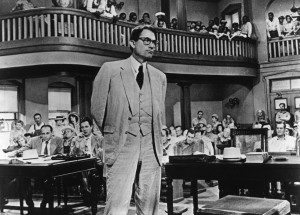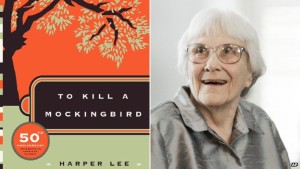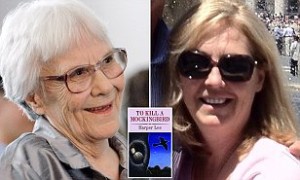 To Kill a Mockingbird is Harper Lee’s classic 1960 novel about racism and criminal justice in early twentieth-century America. I enjoyed reading it more than any other required reading in high school. And I don’t mind admitting that I found the 1962 film adaptation even more enjoyable; so much so that I’ve watched it over and over again and found enjoyment anew each time.
To Kill a Mockingbird is Harper Lee’s classic 1960 novel about racism and criminal justice in early twentieth-century America. I enjoyed reading it more than any other required reading in high school. And I don’t mind admitting that I found the 1962 film adaptation even more enjoyable; so much so that I’ve watched it over and over again and found enjoyment anew each time.
Therefore, you’d think I would be among those cheering this week’s breaking news about the publication of Lee’s purported follow-up novel, Go Set a Watchman. It chronicles goings-on in the lives of To Kill a Mockingbird’s main characters twenty years later. Except that, having read about the dubious provenance of this sequel, I just feel like jeering.
To begin with, Go Set a Watchman is reportedly based on a completed manuscript Lee’s editor persuaded her to put aside in order to publish To Kill a Mockingbird. This alone raises many obvious questions. Most notably: Why was Go Set a Watchman deemed so unworthy of publication back then? What has changed to make it worthy today … 55 years later?
 Did Lee write To Kill a Mockingbird as a sequel but published it as an original, making Go Set a Watchman a novel she wrote as an original but is now publishing as a sequel…? Does any of this make any sense to you?
Did Lee write To Kill a Mockingbird as a sequel but published it as an original, making Go Set a Watchman a novel she wrote as an original but is now publishing as a sequel…? Does any of this make any sense to you?
Then, of course, there’s the disqualifying fact that Lee (88) suffered a stroke in 2007, leaving her severely incapacitated and confined to an assisted living home. Which raises all kinds of questions about her fitness to approve publication of this manuscript, assuming she actually wrote it. The publisher is an imprint of HarperCollins called Harper, deceptively enough. But there is simply no way Harper can authenticate any of the words it is ascribing to Lee in these regards.
This, from a refreshingly skeptical report in yesterday’s Daily Mail, is particularly damning:
Alice Lee, who died in November at 103, told a reporter before her death that her sister … ‘can’t see and can’t hear and will sign anything put before her by anyone in whom she has confidence.’
 Lee’s big sister Alice was generally recognized as her most dedicated lawyer, companion, and protector. (Vincent had Theo; Harper had Alice….)
Lee’s big sister Alice was generally recognized as her most dedicated lawyer, companion, and protector. (Vincent had Theo; Harper had Alice….)
Yet, just months after Alice’s death, young Alabama lawyer Tonja Brooks Carter, who Alice hired right out of law school in 2006, assumed that role. More to the point, she’s claiming not only that she is the gatekeeper between Lee and the outside world, but also that she just happened to stumble upon the manuscript while sorting through Lee’s archives.
But it requires a willing suspension of disbelief to buy her story about suddenly finding what neither Lee nor Alice could for 55 years. And Lee’s publisher is probably banking on such willing suspension of disbelief among fans of To Kill a Mockingbird to peddle other “long-lost manuscripts” — as the New York Times hails this one so disingenuously….
 Again, Lee suffered that stroke within a year of Alice hiring this literary gold digger.
Again, Lee suffered that stroke within a year of Alice hiring this literary gold digger.
It was a moment of serendipity that led to the blockbuster literary news, one in which Ms. Carter played a key role, the publisher says.
(Wall Street Journal Law Blog, February 4, 2015)
Serendipity? Try jackpot.
Above all, though, it speaks volumes that, for 50-plus years, Lee declared no intent to publish this long-lost manuscript, or any other work for that matter. What’s more, her publisher can cite no public statement signaling any intent to the contrary; not least because Lee was so reclusive and media averse she made J.D. Salinger look like the Kim Kardashian of literary one-hit wonders.
 But frankly, whatever the provenance, and no matter the publisher’s assurance, here is why I’m not buying the hype about Go Set a Watchman being the fortuitous discovery of a literary masterpiece:
But frankly, whatever the provenance, and no matter the publisher’s assurance, here is why I’m not buying the hype about Go Set a Watchman being the fortuitous discovery of a literary masterpiece:
It occurred to me that, if [producers] could make it appear like Michael had risen from the dead to perform live on stage, they could probably make it sound like he had risen from the dead to record new songs in studio too. This would surely put a new spin on the dubious practice of selling ‘previously recorded but unreleased songs’ after a singer’s death. After all, the reason most songs remain unreleased is that the singer thinks they suck.
(“More Proof Michael Was Not ‘Gone Too Soon,’” The iPINIONS Journal, June 20, 2014)
In other words, the reason Go Set a Watchman remained unpublished all those years is that Lee thought it sucked. I am cynical enough to believe, however, that this publisher has retained editors to make it read more like Lee than To Kill a Mockingbird does.
‘I ain’t cynical, Miss Alexandra. Tellin’ the truth’s not cynical, is it?’
(To Kill a Mockingbird)
Moreover, it just strains credulity for those who have conspired to publish this second/first novel to have us believe that:
Ms. Lee wasn’t immediately sold on the idea of releasing it but was persuaded after a handful of people read it and reassured her it was worth publishing.
‘After much thought and hesitation, I shared it with a handful of people I trust and was pleased to hear that they considered it worthy of publication,’ she said.
(New York Times, February 3, 2015)
After all, where, pray tell, were these handful of persuasive people for those 55 years, during which Lee surely thought and clearly hesitated….
Truth be told, I think the greatest literary fraud in the history of publishing is afoot, constituting a brazen betrayal and exploitation of one of America’s most beloved literary figures.
To their credit, Michael’s executors are up front about their intent to milk songs that he, in his sound mind, clearly did not consider worthy of releasing. Even though not as forthcoming, Lee’s guardians are not as forthcoming, but they are manifesting similar intent to milk this manuscript that she, in her sound mind, clearly did not consider worthy of publishing. That, notwithstanding this:
People in their right minds never take pride in their talents.
(To Kill a Mockingbird)
Wink, wink….
Related commentaries:
Michael…